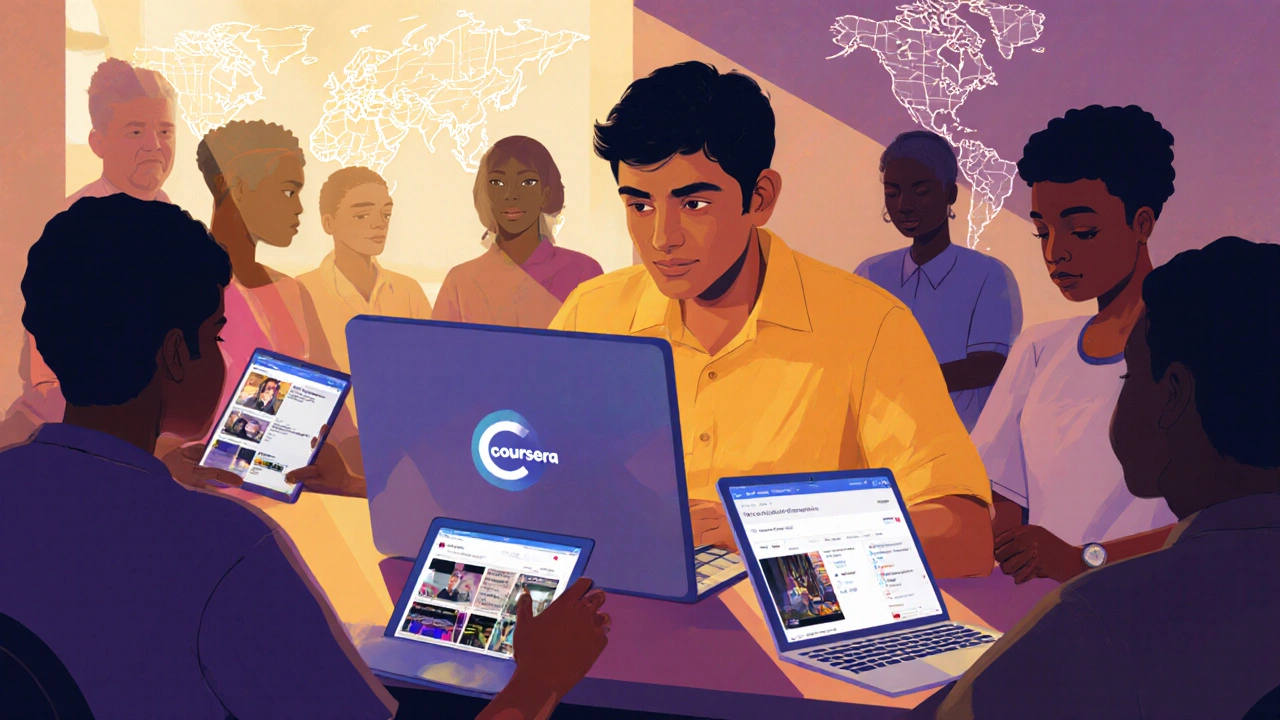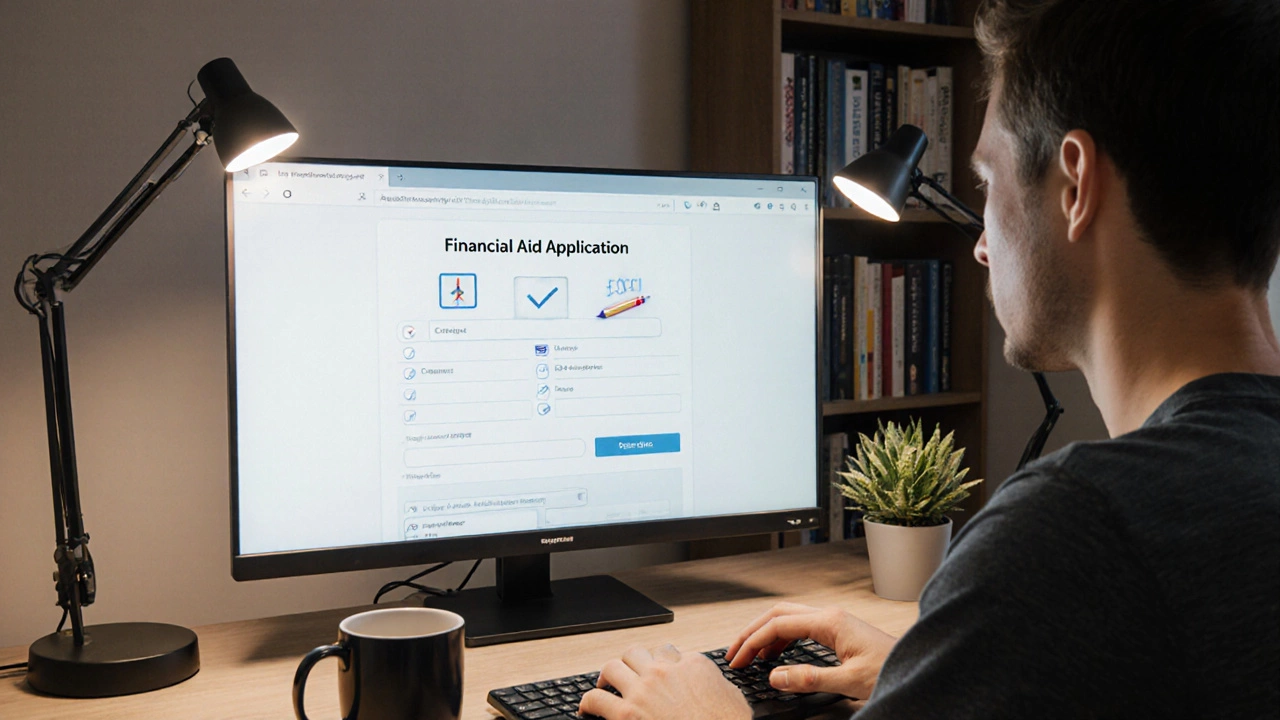Get Coursera Courses Free - Step‑by‑Step Guide

Coursera Free Access Comparison Tool
Free Access Options Overview
- Audit Mode: Watch lectures and read materials for free, but no certificate.
- Financial Aid: Full course access including graded assignments and certificates at no cost.
- Free Trial: 7-day access to all features including certificates.
- Partner Programs: Free enrollment through university or organization partnerships.
Compare Features
| Feature | Audit Mode | Financial Aid | Free Trial | Paid Enrollment |
|---|---|---|---|---|
| Video Lectures | ✓ | ✓ | ✓ | ✓ |
| Graded Assignments | ✗ | ✓ | ✓ | ✓ |
| Verified Certificate | ✗ | ✓ | ✓ (if completed before trial ends) | ✓ |
| Course Duration Access | Indefinite | Indefinite | 7 days | Lifetime |
| Peer Discussion & Feedback | Limited | Full | Full | Full |
Which Option Is Right For You?
Important Tip:
Always apply directly through Coursera.org. Avoid third-party sites claiming to offer "free certificates" – they're likely scams.
When you hear about Coursera is a global platform that hosts thousands of Massive Open Online Courses (MOOCs) from top universities and companies, the first thought is often the price tag for certificates. The good news? You don’t have to spend a penny to learn. Below you’ll find every legit way to enjoy Coursera for free, plus tips to avoid the common traps.
Key Takeaways
- Audit mode lets you watch all video lectures without paying.
- Coursera financial aid can cover 100% of a course’s cost if you qualify.
- Free trials and promotional coupons give temporary access to paid features.
- Partner university programs sometimes provide full enrollment at no charge.
- Stay clear of scam sites promising "free certificates" in exchange for personal data.
How Coursera’s Pricing Works
Understanding the pricing structure makes it easier to spot the free routes.
- Audit mode: Watch videos and read materials for free, but you can’t submit graded assignments or receive a certificate.
- Financial aid is a program where Coursera evaluates your need and, if approved, waives the entire fee for the paid version of a course.
- Free trial (usually a 7‑day trial of Coursera Plus) gives full access to all courses, including graded assignments and certificates.
- Coursera Plus is a subscription service that costs around $399 per year, offering unlimited course access.
- Certificates are optional proof of completion and typically cost $49‑$99 per course or are bundled in a specialization.
Auditing a Course - The Simplest Free Option
Auditing is perfect if you just want to learn the material without a credential.
- Go to Coursera’s homepage and search for the course you want.
- Click the course tile and scroll down to the "Enroll for Free" button. It usually reads "Audit only" or "Full Course, No Certificate".
- Select the audit option. You’ll be taken straight to the first week’s videos.
- Navigate the weeks using the left‑hand menu. All video lectures, readings, and ungraded quizzes are available.
- If you decide later you need a certificate, you can switch to the paid version at any time from the same page.
Note: Some courses hide the audit button behind a pop‑up. Click "Learn more" and look for a small "Audit" link at the bottom.

Applying for Coursera Financial Aid
Financial aid unlocks the full paid experience - graded assignments, peer feedback, and a verified certificate - for free.
- Find the course you want and click the "Enroll" button.
- On the enrollment pop‑up, look for the link "Financial aid available?" and click it.
- Fill out the application (usually 2-3 minutes). You’ll need to answer:
- Why you want to take the course.
- How the course will help your career or personal goals.
- Your annual income and why you can’t afford the fee.
- Submit the form. Coursera typically reviews applications within 15 days.
- If approved, you’ll receive an email with a link to enroll at 0$.
Tips for a higher approval chance:
- Be honest about your financial situation.
- Explain concrete goals - e.g., "I need data‑science skills to qualify for a junior analyst role."
- Proofread - a well‑written essay signals seriousness.
Free Trials, Coupons and Promotional Offers
Coursera occasionally runs time‑limited promotions that grant free access to premium content.
- 7‑day Coursera Plus trial: Sign up with a credit card; cancel before the trial ends to avoid charges. You’ll get full access, including certificates, for the trial period.
- Seasonal coupons (e.g., "Back to School", "New Year"). Search reputable coupon sites or Coursera’s own email newsletters.
- University partnership programs: Some colleges provide free Coursera subscriptions to their students as part of enrollment.
Partner University Programs & Scholarships
Many top universities collaborate with Coursera to offer scholarships or free enrollment for certain demographics.
- Partner universities such as Stanford, University of London, and IBM occasionally launch free‑access cohorts for under‑represented groups.
- Government‑backed workforce programs (e.g., UK’s National Careers Service) sometimes include Coursera vouchers.
- Non‑profit initiatives like "Google Career Certificates Scholarship" grant free access to specific professional tracks.
Comparison: Free Options vs. Paid Enrollment
| Feature | Audit Mode (Free) | Financial Aid (Free) | Free Trial (7‑day) | Paid Enrollment |
|---|---|---|---|---|
| Video Lectures | ✓ | ✓ | ✓ | ✓ |
| Graded Assignments | ✗ | ✓ | ✓ | ✓ |
| Verified Certificate | ✗ | ✓ | ✓ (if completed before trial ends) | ✓ |
| Course Duration Access | Indefinite (as long as Coursera hosts the content) | Indefinite | 7 days | Lifetime (usually) |
| Peer Discussion & Feedback | Limited | Full | Full | Full |
Pitfalls & Scam Alerts
Free access is legitimate, but the internet is full of shady sites promising "download Coursera certificates for free". Here’s what to watch out for:
- Requests for your credit‑card number without a clear trial explanation.
- Sites that require you to install unknown software or browser extensions.
- Offers that ask for personal data beyond basic email and name.
Always stay on the official Coursera domain (coursera.org) when applying for financial aid or enrolling in a trial. If a deal seems too good to be true, it probably is.
Next Steps - Choose Your Free Path
Pick the route that matches your goal:
- Just want to learn? Start with audit mode - no paperwork needed.
- Need a certificate for a résumé? Apply for financial aid; you’ll get the full experience for free.
- Short‑term project? Use the 7‑day Coursera Plus trial and finish the assignment quickly.
- Student or employee? Check if your institution offers a partnership or scholarship.
Whichever path you choose, you’ll be able to upskill without breaking the bank.
Frequently Asked Questions
Can I get a Coursera certificate for free?
Yes. If you qualify for Coursera financial aid, the entire fee - including the certificate - is waived. The certificate you receive is identical to the paid one.
Is auditing a course completely free forever?
Auditing gives you perpetual access to all video and reading materials. However, you won’t be able to submit graded quizzes or earn a certificate unless you switch to the paid version.
How long does financial aid approval take?
Coursera usually reviews applications within 10‑15 business days. You’ll get an email with the decision and a direct enrollment link if approved.
Can I use multiple free trials for different courses?
Coursera limits one free trial per account. After the trial ends, you’ll need to either pay or switch to audit/financial aid for additional courses.
Are there any hidden fees when auditing?
No. Auditing is truly free. Just avoid clicking the "Upgrade" button if you don’t want to be charged. Your payment info is never collected in audit mode.

Post-Comment